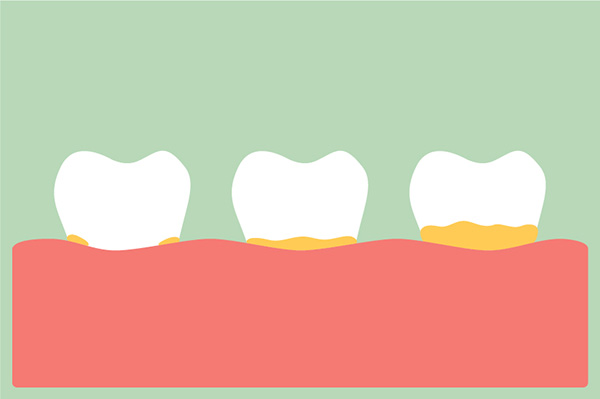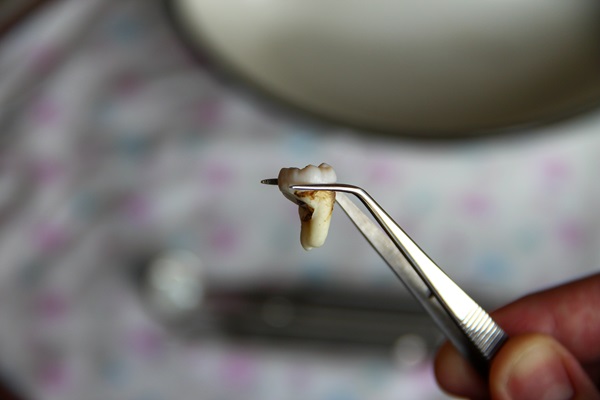 Receding gums can be the result of plaque build-up underneath gum tissues. The bacteria in plaque can infect tissues underneath the gums, activating the body’s inflammatory response. The inflammation leads to gum tissues pulling back from teeth roots, exposing said roots to acids made by oral bacteria.
Receding gums can be the result of plaque build-up underneath gum tissues. The bacteria in plaque can infect tissues underneath the gums, activating the body’s inflammatory response. The inflammation leads to gum tissues pulling back from teeth roots, exposing said roots to acids made by oral bacteria.
Teeth roots do not have the luxury of being protected by enamel, the most durable substance in the body. They are covered with cementum, which is not as durable, making them more vulnerable to acids in the mouth. Teeth roots are covered with gum tissues to help protect them against these acids.
How plaque build-up leads to receding gums
Bacteria in the mouth create plaque. It is a sticky film that builds up on teeth and contains the bacteria and acids that the bacteria produce. Plaque can creates a sticky feeling in the mouth after sleeping.
Plaque accumulates on teeth, especially at their base. Some plaque can get beneath the gum line, infecting tissues there. Fortunately, plaque can be removed by brushing or flossing teeth, protecting against tooth decay and gum disease.
However, plaque calcifies into tartar when left on teeth for prolonged periods. Brushing and flossing cannot eliminate tartar buildup on teeth, and tartar can also make its way into gum pockets and teeth roots. Tartar promotes tooth decay and infects gum tissues, leading to gum disease. Tartar has to be removed with a scaler during teeth cleaning sessions. The American Dental Association recommends getting teeth cleaned at least twice a year to prevent excessive tartar buildup and protect against tooth decay and gum disease.
How a dentist treats receding gums
receding gums might be a symptom of gum disease, so anyone who develops the condition should visit a dentist immediately. A dentist can evaluate the patient to determine the root cause of their receding gums. A probe is typically used to measure the depths of gum pockets to determine if plaque and tartar have built up inside them. Healthy gum pockets should be somewhere between one to three millimeters. Anything deeper than five millimeters is usually a sign of periodontal disease. Once a patient has been diagnosed with gum disease, a dentist might address their condition with treatments like:
- Medication: Antibiotics might be prescribed to help manage the infection in the patient’s gum tissues
- Root scaling and planing: This is a more extensive form of teeth cleaning that involves removing plaque and tartar from teeth surfaces and roots; the procedure also includes polishing teeth roots, making it harder for tartar to accumulate on them
- Gum grafts: Receding gums leaves teeth roots exposed, which makes them vulnerable to acids made by oral bacteria; the procedure involves taking donor tissue from other areas of the mouth and using them to cover exposed teeth roots
Get treatment for receding gums
Receding gums might be a sign of periodontal disease, a condition that can lead to your teeth falling out. Call or visit our Palm Beach Gardens clinic to set up an appointment with our dentist.
Request an appointment or call Rafael E. Cordero, DDS PA at 561-763-9221 for an appointment in our Palm Beach Gardens office.
Recent Posts
Gum disease treatment is necessary to prevent your symptoms from worsening. Your periodontist will assess your gums first and then discuss the treatment options with you. Knowing when to see this dental care provider can help you make informed decisions regarding your procedures. Here are the details on when to see this dentist for gum…
A gum recession treatment can help you regain your smile and dental health. Receding gums can make you conscious about the way you look. It can also cause dental instability and sensitivity. Seeing a periodontist for your gum recession treatment can help you get the results you need.A general dental exam can spot gum recession.…
Dentists talk about the effects of gum disease from the time patients are young. There are good reasons for this, as the disease can have significant impacts on a person’s oral health. The disease is common among children, teens, and adults. Fortunately, it is highly preventable. For the most part, you can take some daily…


